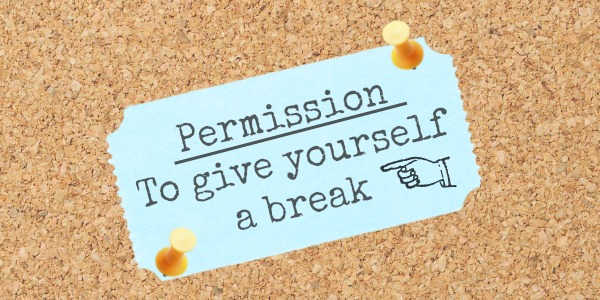
Have you ever been afraid to speak up in a meeting? Or afraid to give a presentation? Or to receive feedback? Or to accept that something about you isn’t as good as it could be? Or struggle to let go of something from the past? Or frequently need affirmation or attention? There could be many reasons for any one of these conditions, but together they all share a common cause – a lack of self-acceptance.
Many people put tremendous pressure on themselves to avoid making a mistake. And when they do, they ruminate over their behaviors and agonize for not performing their best. Then, going forward, many shut down. They avoid conversations and presentations for fear of being judged by others. They don’t open themselves to feedback or critique because they don’t have enough self-confidence to receive it. They shy away from responsibility because they can’t handle the potential for blame. This inability to accept who we are, mistakes and imperfections included, makes us fearful.
There have been many remedies provided to overcome these fears. Some people tell themselves “I can do it” or “I’m good” to offset their fear of making a mistake. Some put themselves above others to feel superior. Some reframe their circumstances or past memories to shift blame to others. Some choose to avoid any potentially embarrassing circumstances altogether. While these can provide temporary relief, they don’t provide a cure. They are often short-lived and, in some cases, exacerbate the underlying problem.
The key to being able to speak in public, take criticism, not depend on others’ approvals, and fully apply yourself in life is to accept yourself. Self-assured people strive to be their best, but also give themselves a break. They are not overly concerned about what others think. They don’t compare themselves to others. They know they are not perfect and that it is okay. They have made mistakes and know they will make them again so they don’t worry about them.
No one is perfect. Everyone makes mistakes. But as obvious as this is, people set unrealistic standards for themselves which sets them up for insecurity, the very characteristic they are trying to avoid.
If you or those with whom you have influence struggle with self-acceptance, here are several principles to assess yourself against to see where you might want to give more attention:
- Strive to be your best, but give yourself a break. Don’t expect to be free of shortcomings. Practice, prepare, learn, train, and do whatever you can to be your best, but accept that you will still make a mistake. Pursue improvement and excellence, not perfection.
- Realize that people who expect perfection are not very approachable or enjoyable to be around. They are never satisfied or happy. Nothing you do is ever good enough for people who expect perfection. Don’t be one of them.
- Don’t depend on others for approval or validation. Don’t outsource your self-esteem to the whims and moods of others. Don’t worry about what others think. They are not flawless either. Place your belief in yourself, not others.
- Know that you are a special blend of DNA, nurturing, education, and life experience. You may not be as talented as others in a given area, but all your traits combined make you an awesome one-of-a-kind person.
- Truly accept yourself. Accept how you look, think, speak, and act. Accept your shortcomings. Accept that you have made mistakes, that you will make mistakes, and that you don’t know everything.
- Don’t compare yourself to your colleagues, friends, neighbors, or family members. You are not in a contest to beat them. Admire them for their capabilities, but don’t envy them or feel the need to be better than them.
- See mistakes as learning opportunities. Rather than feel shame from your mistakes, pity those who’ve not made many mistakes because they’ve not had many lessons. They don’t have the experience you do.
- Forgive yourself. Realize that you’ve done what you’ve done based on what you knew and could do at the time. Particularly if you had honorable motives, know that you were trying to do what you thought was right.
- Be real. Be yourself. People would rather be around others and listen to those who are authentic. People don’t expect flawlessness. They want passion, emotion, and reality, not facades or fakes.
- Don’t try to create critics, but be glad for them when they don’t hold your values. If they are not honorable, they don’t deserve your respect. Stop trying to win them over. Realize that if they were fans of yours, you would probably be like them.
- When dealing with mistakes, analyze them only to the extent you can learn from them. Learn the lesson to be learned and then look forward. Dwell on what you will do better next time rather than ruminate on what you did wrong last time.
- Appreciate your idiosyncrasies. Don’t take yourself so seriously. Laugh at yourself. It’s okay to be quirky. Be different. Go enjoy the freedom to be yourself and live your life, not someone else’s.
As the proverb goes:
“When you believe in yourself, you don’t try to convince others.
Because you are content with yourself, you don’t need others’ approval.
When you accept yourself, the whole world accepts you also.”
Article by Mike Hawkins, award-winning author of Activating Your Ambition: A Guide to Coaching the Best Out of Yourself and Others (www.ActivatingYourAmbition.com), author of the SCOPE of Leadership six-book series on coaching leaders to lead as coaches (www.ScopeOfLeadership.com), and president of Alpine Link Corp (www.AlpineLink.com), a boutique consulting firm specializing in leadership development and sales performance improvement. For other articles on reaching your peak potential, visit: www.alpinelink.com/blog
